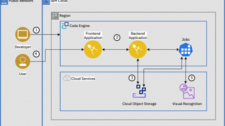Upgrade & Secure Your Future with DevOps, SRE, DevSecOps, MLOps!
We spend hours on Instagram and YouTube and waste money on coffee and fast food, but won’t spend 30 minutes a day learning skills to boost our careers.
Master in DevOps, SRE, DevSecOps & MLOps!
Learn from Guru Rajesh Kumar and double your salary in just one year.
Source:-https://www.infoq.com
IBM has recently announced the beta availability of a new serverless compute service called IBM Cloud Code Engine. The service is a managed serverless platform that runs containerized workloads, for example web apps, micro-services, event-driven functions and batch jobs.
A follow up article describes the use cases and the open source technologies used to build Code Engine, including Knative, the Kubernetes-based platform to deploy and manage serverless workloads, the service mesh Istio, and Tekton, the framework for creating continuous integration and delivery (CI/CD) systems. Cong Nguyen, developer advocate at IBM, tweets:
IBM emphasises the open source layers and the portability of the platform, explaining that while it offers a simplified user experience, developers can still fully customize the Kubernetes data model or reuse existing deployment scripts on Code Engine.
Depending on the load, Code Engine automatically scales the containers, including scaling to zero when no requests are active. A container image is not a prerequisite to use the service: Code Engine can bundle the source-code from a Git repository with a supported runtime environment, what IBM calls a “buildpack”, and generate the container. A guide on how to do it is available in the IBM Cloud Design Engineer Gitbook.
The About IBM Cloud Code Engine covers the main concepts, names and terminology used on the platform. The first tutorial provided by IBM shows how to build a visual recognition platform, using Code Engine and the Cloud CLI.
Harald Uebele, developer advocate at IBM Germany, wrote a detailed article on in his personal blog on how to run containers serverless on Code Engine, highlighting the use cases where the new platform should excel:
While Christophe Boulangé, Cloud Director at BNP Paribas, labels it the “FaaS next-generation” other developers question the advantages against other existing offers: “What is the strongest part of this solution against AWS lambda, or Cloud Functions from GCP?”

 Starting: 1st of Every Month
Starting: 1st of Every Month  +91 8409492687 |
+91 8409492687 |  Contact@DevOpsSchool.com
Contact@DevOpsSchool.com